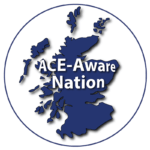ACEs to Assets – Fostering Resilience in a Stressed Culture
Held on 11 June 2019 in Glasgow
Scotland is currently in the grip of a movement increasing awareness of Adverse Childhood Experiences (ACEs). The science is in and the evidence is glaring that childhood adversity creates harmful levels of stress that impact on healthy development of the brain and body.
Trauma left untreated, unchecked and unresolved has major long-term consequences, with effects on learning, behaviour and health.
It is for this reason that we are partnering with Justice, Health, Education and the Care Sector to bring you a one-day conference with input from the world-renowned trauma expert Dr Gabor Maté. He will address the biopsychosocial view of stress, trauma, attachment, illness and addiction. More importantly, he will explore the actions we can take as a society and as corporate parents for a healthier, connected, and socially just society.
Dr Gabor will weave his insight and expertise through four key sectors:
Justice – There is no justice without health. Policy can exacerbate and entrench addiction criminal behaviour and human suffering. The event will explore changes in social policy, medical training and criminal justice that would enable us to become more fully aligned with the current scientific understanding of addiction and healing.
Health – Emotional stress is a major cause of physical illness, from cancer to autoimmune conditions and many other chronic diseases. The brain and body systems that process emotions are intimately connected with the hormonal apparatuses, the nervous system, and in particular the immune system. This event will consider what needs to happen in the health system in order to take on board this information, in terms of medical practice and policy.
Education – The event will consider implications of this information for the educational sector. It will encompass themes including peer orientation; why children are stressed; why parents and teachers are disempowered; and how a healthy balance in adult-child relationships can be restored. Given the goals of the Scottish Government for attainment, we will be sure to look at how relationships with nurturing adults influence attainment goals/
Care System – Losing the world you grew up in is hard. The event will reflect on the biology of loss, attachment, and abandonment in the care system. The importance of early beginnings will be explored, alongside their correlation with lifelong emotional, neurophysiology and behavioural patterns. We will explore and explain human dysfunction, in terms of mental, emotional and physical frameworks, including the links l between postnatal depression and parental stress in the development of ADHD, mental illness and addiction.
This event addresses one of the national ambitions expressed by our First Minister:
“Scotland’s ambition is to be the inventor and the producer, not just a consumer, of the innovations that will shape the lives of our children and grandchildren.”
– Rt Hon Nicola Sturgeon MSP, First Minister of Scotland
Gabor Maté has written about these topics in four books:
- In The Realm of Hungry Ghosts: Close Encounters With Addiction (2008)
- Hold on to Your Kids: Why Parents Need to Matter More Than Peers (2005)
- When the Body Says No: The Cost of Hidden Stress (2004)
- Scattered Minds: A New Look at the Origins and Healing of Attention Deficit Disorder (2000)
Dr Maté’s books bring together a coherent message that “Trauma is not what happens to us, but what happens inside us.” In this event, he will explore the basis of physical disease, mental illness, addiction and childhood developmental problems. He will illuminate all these conditions not as separate diagnostic entities, but as bio-psychosocial phenomena, manifestations of the unity of mind and body, physiology and psychology, and of the individual with the social environment. He will argue that treatment approaches, child rearing practices, and the issues we see in our justice system must flow from such a holistic understanding.
Participants will:
- Learn how our early environment shapes us psychologically and physiologically and may create a life-long template for stress-generating behaviours and emotional functioning. These, in turn, can trigger the onset of disease.
- Recognise the stress-driven and therefore disease-prone personality and how to reverse the unconscious dynamics that lead to stress.
- Learn about how early experiences influence brain development, the conditions necessary for healthy development and those that impair it.
- Understand the nature of addiction neither as a choice or genetically-determined brain disease, but as a complex psychological and physiological response to trauma.
- Understand the brain circuits implicated in addiction and the dynamics that need to be addressed in the healing of addiction.
- Appreciate the social basis of addiction in economic and cultural dislocation and insecurity, and in historical trauma.
- Develop an understanding of mind/body unity as illuminated by modern science in the field of psychoneuroimmunology.
- Recognise and shift the focus from the behaviours we see in our justice systems as not all being simply a moral issue but as a health issue that needs a more holistic and compassionate response in working with these individuals in the community.
- Develop a sophisticated understanding of the nature of compassionate and science-based approaches to the healing and prevention of trauma.



